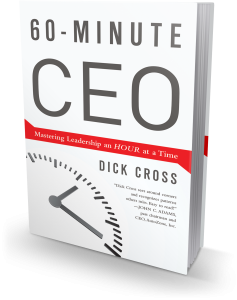The ease with which big business — our legacy base — now moves globally seeking lower costs means new anchor points for the US economy. One of these could be a blooming of lower and mid-tier enterprise, which with the right support could more than occupy the places of our historical mainstays.
However, there’s a flaw. Out of our roughly a half million business starts a year, fewer than half last 5 years. Survival drops to 10% at the ten-year mark. And only a few that do endure ever come close to reaching their potentials.
It’s not because these businesses aren’t good ideas. Or because their owners are lazy. Or because of bad luck. The disappointment for us all tracks back to two pervasive shortcomings.
One is to a lack of higher level business perspective among entrepreneurs. Ask any lower or mid-tier business owner one question, “how do you run a business” and the response will be a blank stare. It’s a question never asked, because no one expects an answer. With Newtonian precision, we study the sub-parts, like production, sales, systems, branding, quality. But scarce is the owner with the ability to combine all those parts into a perspective that allows him or her to drive a lower or mid-tier business to its ultimate possibilities for job creation and contribution to economic growth. That kind of thinking accrues most reliably to those who have served at the helm of several businesses before.
The second shortcoming is capital. The kind of capital that is willing to make the risky bets that turn yet-to-be great business into a powerhouses. Conservatism has always been the bylaw in commercial lending, but never more so than today. Simple lines of credit remain difficult. And debt from traditional lenders for heroic, yet speculative expansions? Forget it!
So, where can these two these silver bullets be found? They’re in the world of private equity.
There, funds are assembled with the explicit intention to make high risk investments that transform businesses stuck at one stage of development or declining into something better. A lot better. Through the applications of capital and higher level business perspectives, hidden business potential can be unlocked.
But it’s a risky game that doesn’t always work. When it doesn’t, it can be a tragedy for everyone involved, employees and investors. But when it does work, over time, the cumulative additions to jobs and economic growth far outweigh the cumulative losses. Particularly if one accepts the premise many of the failures were well along the way toward disappointing ends well before the intervention of private equity. At least someone was willing to take the risk.
So, why the current attack on private equity? Why not recognize Romney and others like him as the kinds of spark plugs we need for a new economy?
Private equity offsets job losses created by business failures
By investing to unlock unrealized potentials, private equity cannot guarantee jobs for employees, anymore than they can guarantee returns for their investors. Often the risks to the jobs assumed are not the acquirer’s fault, but rather reside with shortfalls in prior owners’ business acumen and capital. Otherwise the companies wouldn’t be sold. New owners, however, must be strongly incentivized do the best they can for new employees. And they are. By the need to return their investors’ money with a multiplier, and to generate returns for themselves. That’s how they stay in business. By creating far more jobs than they lose, out of a pool of otherwise unlikely and marginal prospects for survival.
The safety net for jobs unable to be saved is the responsibility of government. A government that does what’s reasonable to help people in need. And it does. By extending unemployment benefits through periods of economic challenge. But sadly, the best intentions of private equity and government will never guarantee joyful outcomes for all. There will always be individual tragedy as a focal point for anyone who wants to make an argument against the benefit to the whole.
Private equity is a driver toward a new economic base
Our economic system is based on rewarding those most who contribute most to the overall good. The prospects for returns must to be high, as they always have been, to encourage the best and brightest to take on the high risks of private equity-type investing. Though we haven’t always called it private equity, the terms of the equation have always been the same. Those who create big results get paid a lot, because the benefits are big for us all, even taking into account the failures along the way.
The argument is flawed for attacking private equity
Therefore, today, it makes no sense to frame the contribution of private equity in a “one strike and you’re out” mentality. Instead, we need to look at the overall contribution versus the costs. Where the arithmetic is greatly positive — companies and jobs built versus lost — the public and the government ought to accolade private equity as heroes, not villains, in moving us all toward our new economy.
Dick Cross is a serial CEO, a resident of Concord, Massachusetts and the author of Just Run It! Running an extraordinary business is easier than you think, for release by Bibliomotion Press, April 2012.
 The Cross Partnership
The Cross Partnership








